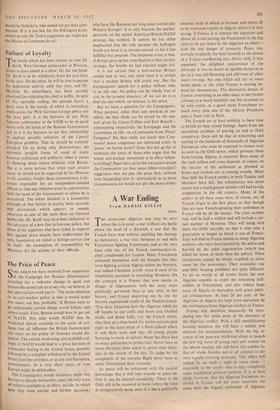The Price of Peace
Sow: letters we have received from supporters of the Campaign for Nuclear Disarmament (couched for a welcome change in quiet and reasonable terms) ask us to say why we believe, as our editorial last week put it : 'The main objection to an anti-nuclear policy is that it would make war more, not less, probable.' If Britain were to go unilateralist certain things would follow, and Others might. First, Britain would have to get out of NATO. Not only would NATO thus be Weakened almost certainly to the point of col- lapse, but all influence the .British Government can exert on the policy of America would dis- appear. The certain weakening and probable col- lapse of NATO would lead to a great increase of isolationist feeling in the United States, possibly followed by a complete withdrawal by the United States from her overseas, or at any rate European, commitments. In a very, short space of time Europe might be defenceless.
The Campaigners would doubtless reply that Europe is already defenceless, since the only form of defence available is, in effect, suicide. In which case they must answer one further question: why have the Russians not long since moved into Western Europe? It is only because the nuclear deterrent of the united American-British-NATO strategy has worked. It cannot be too often emphasised that the only purpose the hydrogen bomb can have is to remain unused; so far it has fulfilled that purpose. The desperate irony is that, if Britain gave up her contribution to that nuclear strategy, the bombs we had rejected might fall.
It is not certain that a non-nuclear Britain would lead to war, any more than it is certain that a nuclear Britain will avoid war. But the Campaigners' search for a policy without risks is an idle one. No policy can be wholly free of risk in the present situation; all we can do is to find the one which, on balance, is the safest.
But we have a question for the Campaigners. What purpose, other than one inimical to our safety, do they think can be served by the sup- port given by Canon Collins and Earl Russell— representing respectively the Campaign and the Committee of 100—to a Communist-front 'Peace' Congress? Do they really not know that Com- munist peace congresses are interested solely in 'peace' on Soviet terms? Does this not go far to reinforce the views of those who argue that the whole anti-nuclear movement is in effect fellow- travelling? Peace has a price but we cannot accept the Communists' (or their naïve fellow-travellers') suggestion that we pay the price first, without even bargaining over it—particularly as in those circumstances we would not get the peace either.


































 Previous page
Previous page